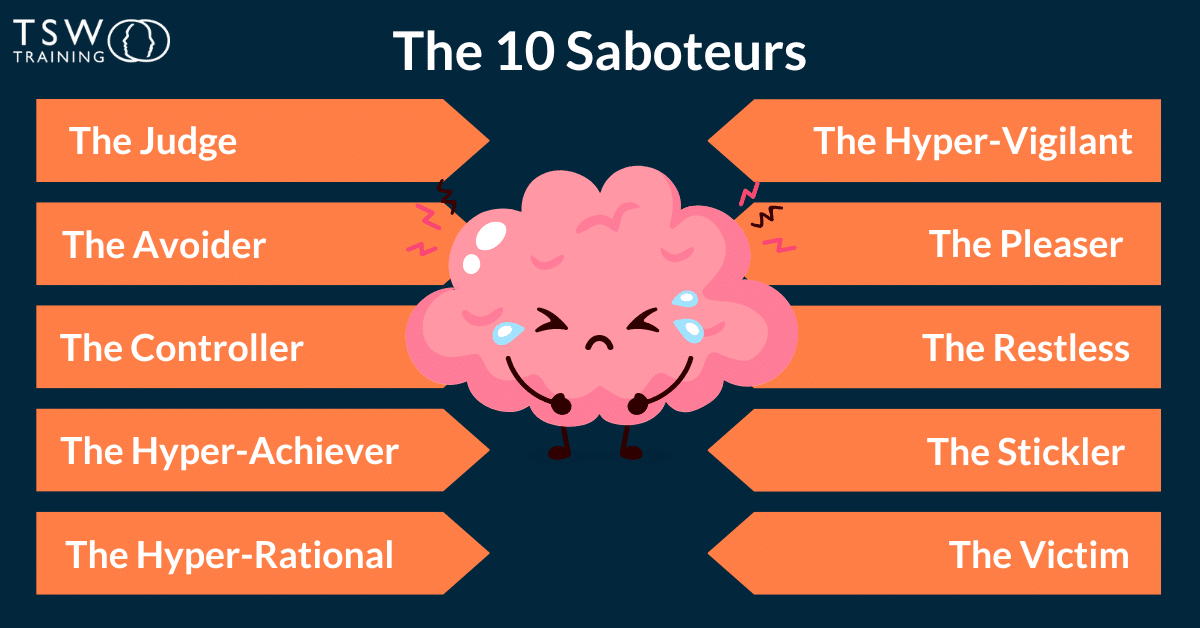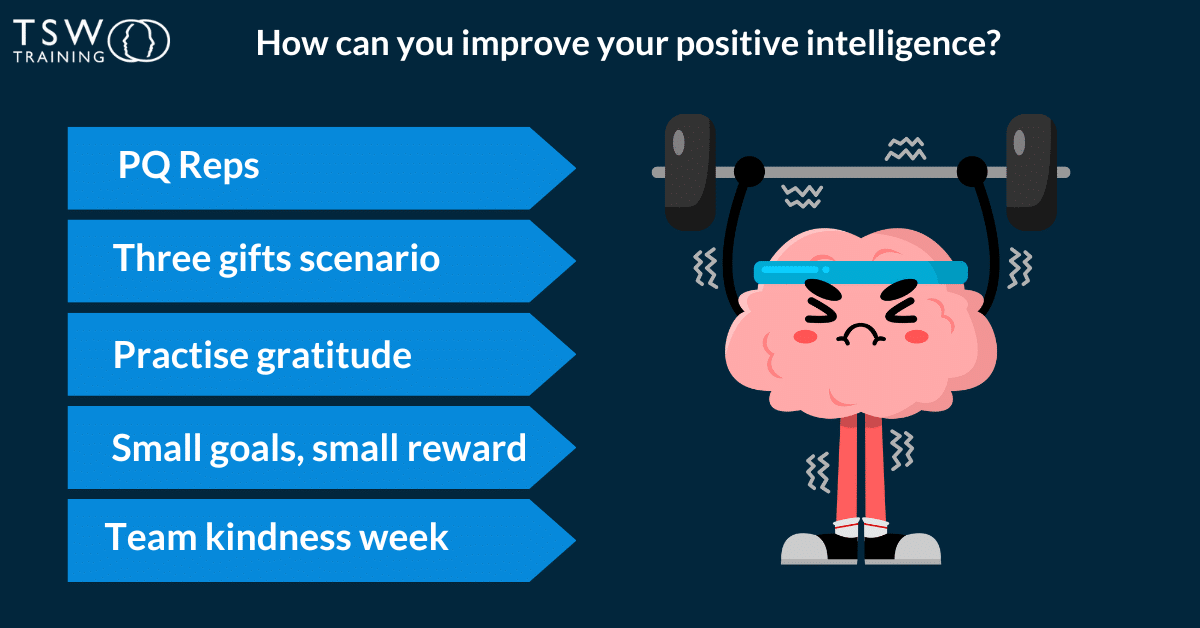Is your mind your friend or your enemy?
Positive intelligence is a theory developed by Shirzad Chamine and it looks at the relationship between how often your mind helps you, compared to how often it hinders you.
Let’s take a deeper look at what positive intelligence is, how to overcome your negative thoughts and how this can impact you in the workplace.
⏰Key Points: What is meant by positive intelligence?
- Positive intelligence quotient (PQ) is the percentage of time your mind works in your best interest.
- Chamine explains it best: “your mind is your best friend, but it is also your worst enemy. Positive Intelligence is the relative strength of these two modes of your mind.”
- There are tests to measure your PQ. So a score of 75% means your mind is on your side 75% of the time, and working against you 25% of the time (Chamine considers this to be a pretty good score)
But don’t worry! Thinking positively is a skill you can build by working the correct ‘muscles’ in your brain. Chamine’s research has uncovered that the left and right areas of our brains think differently – the left part is called the ‘saboteur’ – or the ‘survival’ zone – and the right is your ‘sage’ area – or ‘thrive’ region.
So you can think of it as taking your brain to the gym for a spot of exercise and targeting specific muscles. Being mentally unfit can cause mental stress, which can take the form of anxiety, depression, frustration, anger and a whole host of other emotions.
Chamine found that those with higher PQ had stronger immune systems, and also benefited from things like lower blood pressure, fewer medical conditions and better sleep.
Sounds good to us!
Watch: Know your inner saboteurs: Shirzad Chamine at TEDxStanford
What does higher PQ mean in the workplace?
Your mind working in your best interest is obviously ideal in any situation. But at work, your mind working against you could be holding you back from your full potential.
In Chamine’s studies, he found that higher positive intelligence can lead to a heftier wage as well as greater success in other areas, like marriage, health, friendships and creativity. Teams with leaders that had a higher PQ even performed 31% better than others.
He also found that those who had higher positive intelligence took less sick days and didn’t burn out or quit as often. Probably because those with a raised PQ are less likely to suffer health-wise.
Is PQ linked to Emotional Intelligence (EI)?
Yes. Positive intelligence and emotional intelligence go hand in hand. This is because EI encourages self-awareness, self-regulation, motivation, empathy and social skills. Like PQ, emotional intelligence can be developed. Having high EI is a huge advantage when it comes to combating the 10 saboteurs of positive intelligence.
What are the 10 saboteurs?
Saboteurs are habitual patterns and negative emotions that your mind defaults to when faced with certain challenges.
The 10 saboteurs are:
#1. The judge
Your master saboteur, the judge will do just that – judge you over mistakes and nag you about the consequences. It’ll make you worry, obsess and fixate, and can trigger other saboteurs to join its crusade, which can impact your concentration, motivation and mood.
#2. The avoider
The ultimate distraction, the avoider will make you dwell on the good and avoid the difficult. It avoids conflict, which isn’t ideal in the workplace as not all conflict is bad.
#3. The controller
Hello anxiety. The controller is all about taking charge. It can be pushy and intimidating, making communication angry and critical, which can make others resentful and cause your relationships with colleagues to deteriorate. No-one wants to work with a control freak.
#4. The hyper-achiever
The hyper-achiever wants to be validated and tends to be a workaholic, neglecting emotional needs and relationships. This might sound like it’s great for the workplace, but it can quickly lead to burnout. It always wants to impress and changes its personality to adapt, which can mean it’s a struggle to form deeper connections.
#5. The hyper-rational
With a preference for analysing rather than experiencing, the hyper-rational needs to rationalise everything. This intense concentration can make it difficult to focus because there is so much to process. Can seem arrogant and unfeeling.
#6. The hyper-vigilant
Dangers are everywhere, and the hyper-vigilant is aware of all of them. It worries about everything that could go wrong and is full of self-doubt and suspicion. It’s reassured by rules and authority, which can be a problem when it comes to creative, flexible work.
#7. The pleaser
It’s that unseen force that makes you hesitant to say ‘no’, the pleaser seeks to be accepted by helping everyone else. Unfortunately, this usually means its own needs are neglected and this fosters resentment, making for a stressful and difficult working environment.
#8. The restless
The restless is easily distracted and impatient, jumping between different activities. This lack of focus can be distracting and hinder the progress of projects.
#9. The stickler
Keeping things organised is the priority of the stickler. This can make the stickler critical and frustrated as it has high standards. Change is unacceptable, which could leave colleagues feeling resentful and full of self-doubt.
#10. The victim
Affection equals attention as far as the victim is concerned. It doesn’t deal well with criticism, focuses on the bad and can often be emotional. This creates a sense of frustration and isolation in the workplace.
This might sound all doom and gloom, but there is hope – sages to the rescue.
How to overcome your saboteurs with the 5 sages
You have 5 sages to defeat your saboteurs. These sages can be used to tackle any saboteur, but there’s an optimal use for each of them:
1. Empathise
One of the key parts of emotional intelligence, the empathy sage can help you be more appreciative, as well as show compassion and forgiveness. It’s all about being more kind and understanding to yourself and others.
- When to use: if strong emotions are involved or you’re not feeling particularly positive, it can help to be more empathetic.
- What it tackles: the judge, the hyper-achiever, the victim and the hyper-rational.
2. Explore
Having an open mind and being curious are good for your mental health as well as your workplace performance.
- When to use: if you need more information about something to help you work out what to do next.
- What it tackles: the judge, the stickler, the hyper-vigilant and the controller
3. Innovate
Considering a different perspective and using unique solutions can help you find a solution when you’re stuck.
- When to use: if your usual approach isn’t working, think outside the box and look at it from a different angle.
- What it tackles: the stickler, the pleaser and the avoider.
4. Navigate
To have integrity and be seen as a reliable co-worker, you need to be able to understand what matters to you and others in order to make solid decisions
- When to use: when you need to decide what path to take, consider what aligns with your or your company’s values and how they fit in with possible solutions.
- What it tackles: the restless, the pleaser and the judge.
5. Activate
If you need to get stuff done, this sage is the one to call on. It can help you get into the zone, which can help your concentration and focus at work.
- When to use: if there’s an obvious action you need to take without getting distracted.
- What it tackles: the avoider, the restless and the judge.
What can leaders do to encourage positive intelligence in their teams?
The most effective method to encourage your team to improve their positive intelligence is by doing it yourself – lead by example.
You can pair up members of your team so everyone is accountable to someone else, to improve motivation and provide support. To measure progress you can all work out your starting PQ scores and monitor them every week to see how much you’ve improved.
Doing this could be great for team building as it gives you a common experience. It could also be really useful for dealing with stress, as well as colleagues that are more difficult to work with. You’ll be more equipped to deal with tricky co-workers and should see some mental health benefits too.
How can you improve your positive intelligence?
Here are a few ways you and your team can improve your positive intelligence:
- PQ reps: a positive intelligence rep involves focussing on any of your five senses for at least ten seconds. That’s one rep. Taking into account distractions and wandering thoughts, you should be able to do around 3 PQ reps per minute. It’s recommended you aim for 36 PQ reps a day to see a benefit.
- Three gifts scenario: think of three ways a bad situation could be turned into a positive. For example, say you were late handing in a project. The three positives could be that you:
- were able to produce a higher standard of work
- you gained a better understanding of how long that particular task takes you
- you were able to build a better rapport with your colleague as you let them know in advance that the project would be late, which fostered feelings of trust and understanding.
- Practice gratitude: think of three things you’re grateful for each day, like your health, family and being able to work on that exciting new project at work.
- Small goals, small reward: If you particularly struggle with the restless saboteur and jump from task to task, you could set small goals with a simple reward to motivate you to stay focussed. Like having a 10 minute break or an extra piece of chocolate after organising your emails.
- Team kindness week: As a team, you could plan a kindness week, where you do one (or more) random act(s) of kindness a day. For example, you could help:
- tidy up the canteen
- offer to assist a colleague with a particular task
- host a fun event for the company to give everyone a break, like an office sports day.
Extra information and resources on positive intelligence
- Positive intelligence website
- Positive Intelligence: Why Only 20% of Teams and Individuals Achieve Their True Potential book by Shirzad Chamine
- The Saboteur Within: The Definitive Guide to Overcoming Self Sabotage book by Matt Hudson
- The Mind Monster Solution: How to Overcome Self-Sabotage and Reclaim Your Life book by Hazel Gale
- Know your inner saboteurs TED Talk – by Shirzad Chamine










